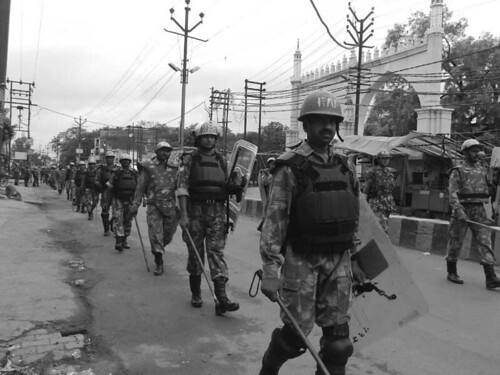By John Dayal,
This is not a Minority Report the church in India was expecting on the first 100 days of the government of the Prime Minister, Mr. Narendra Modi, who his ardent devotees in his Bharatiya Janata Party and its ideologue engine the Rashtriya Swayamsewak Sangh expect to take the country in its golden age of development and global pre-eminence.
A recent rash of incidents against smaller church groups and believers in the northern state of Uttar Pradesh, following the ban on Christian activity in several villages of the Bastar region of Chhattisgarh, have caught the church leadership by surprise. And it has also stunned it into silence, at least for the moment. There has been no media statement by any senior religious leader, no demonstrations and protests, no memoranda to Mr. Modi.
The response has, in fact, come from civil society whose members, veterans of long years of challenge to the hyper-nationalist political religious groups, collectively called the Sangh Parivar, see the anti-Christian violence as but a part of a larger conspiracy to polarize the polity further and consolidate the electorate gains of the recent general elections.

File Photo for representation purpose
The Christians are targeted in what is called Ghar Wapsi, or Home-coming, which is a polite word for coercive conversion of the Indigenous people’s groups in Tribal India. The process against Dalits, the former untouchable castes who profess the Christian faith, is called Shuddhikaran, or purification, an ironic phrase, which holds “non-Indic” or Semitic religions to be polluting.
The popular rage against Muslims, especially in rural areas and small towns, is built upon the myth of Love Jihad, an allegation that Islamic young men have been trained to seducing Hindu women to force a demographic change in India and reduce the Hindu population to a minority. Demographers, sociologists and gender activists have dismissed Love Jihad as a political humbug. Many of the scores of incidents of violence against Muslims in Uttar Pradesh this year have been triggered by such rumours.
Unlike Chhattisgarh which is ruled by the BJP, Uttar Pradesh is governed by the Samajwadi Party of Chief Minister Akhilesh Yadav. The Samajwadi Party and the BJP are locked in a bitter struggle for political supremacy.
One of several cases of coercive action including physical violence from this region include the August 27, 2014 conversion of a large family of Dalits who were members of the Seventh Day Adventist church in Asroi village, some 30 km south of the university town of Aligarh in Hathras District. An aggressive group of activists of the Sangh Parivar brought with them a Hindu priest and a photograph of a deity and performed a “hawan” or fire-worship ceremony to “purify” the small church into a temple. The police arrested several of the miscreants. The one room church is locked up, and the village now has no Christian presence. The media in the region, which sides with the BJP, said the Dalits returned to Hinduism because they received no benefits from the church.
In the Greater Noida area also in western Uttar Pradesh, 10 pastors were thrashed by a mob led by a local political leader, and dragged to the police brought in for questioning to Surajpur Police station in Greater Noida on Saturday over allegations that they were “forcefully converting Hindus to Christianity”. The police also joined the group to beat the pastors. Days later, an enquiry by senior officers exonerated the pastors and said the politicians had made a false allegation to incite the mob and rouse religious passions in the villages.
These incidents have deeply disturbed the community. The situation in the rural areas is exacerbated to a situation where Christian pastors and persons who have been attacked are afraid to even file a complaint with the police as they feel totally isolated and surrounded.
The acts of violence also take away much from the reassurance that was sought to be given by some leaders of the larger denominations that Mr. Modi would control extremist Hindutva elements so that he could channelize national energies into development of infrastructure, social amenities and economic growth.
Civil society groups caution that the Christian community must not be lulled into a false sense of security presuming the focus of the Sangh Parivar is on neutralizing the political clout of the Muslim community which is seen as an ally of the Samajwadi party and other groups. The BJP has recently nominated the controversial religious leader Adityanath, who is also a member of Parliament, to lead its election campaign in Uttar Pradesh. Mr. Adityanath has taken up his new tsk with gusto, with a series of virulent verbal attacks on the Muslim community.
The well-known sociologist, Prof. Shiv Visvanathan recently wrote: “The new majority wants to capture history and politics and rewrite culture to align it with its subconscious. The tyranny of an exploding subconscious, where the majority literally launders its repressions, creates clouds of uncertainty. There is fear, doubt and suspicion. The regime stays silent as little obscenities are enacted.”
Civil Society, which had organised a national campaign to educate the people about the “Idea of India”, a secular, plural and inclusive country, is planning a national convention to sensitise the people on the need for the unity of the people to thwart any political conspiracy that threatens peace between religious communities and freedom of faith.
Religious minorities hope such efforts will bear fruit. In a country as large as India, with 600,000 villages and a police force grossly inadequate, ill-equipped and ill-trained, succor lies in the wisdom and tolerance of the common people.
(John Dayal is the general secretary of the All India Christian Council and a member of the Indian government’s National Integration Council. www.johndayal.com )

